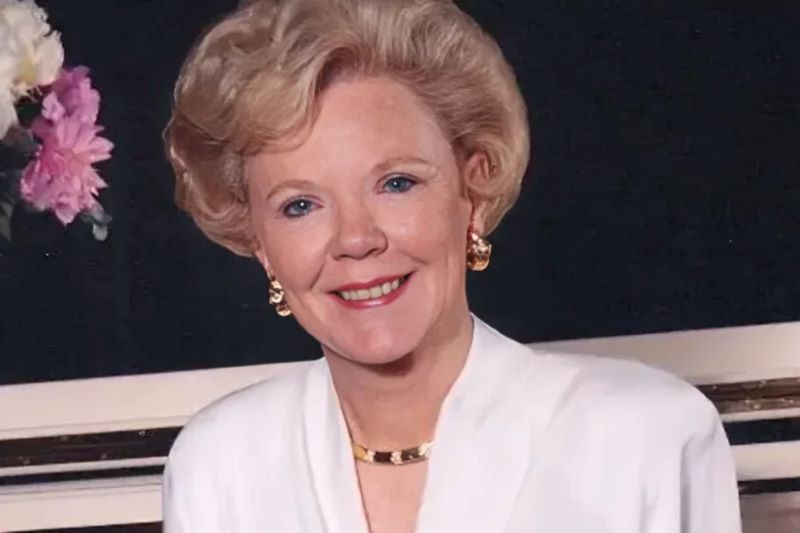Marilyn Kroc Barg, born on October 15, 1924, in Chicago, Illinois, is often overshadowed by her father, Ray Kroc, the man credited with transforming McDonald’s into a global fast-food powerhouse.
Despite this association, she emerged as a notable figure in her own right, demonstrating profound commitments to philanthropy and community service throughout her life.
This article explores the multifaceted life of Marilyn, from her early years to her philanthropic endeavors that continue to impact many today.
Early Life and Family Background
As the only child of Ray Kroc and his first wife, Ethel Janet Fleming, Marilyn’s youth was influenced by both the bustling life of post-war Chicago and the ambitious entrepreneurial spirit of her father.
Growing up amidst the backdrop of Ray Kroc’s burgeoning business ventures shaped a unique childhood, blending modest beginnings with the eventual rise to affluence and fame.
The values instilled in this loving environment—hard work, humility, and resilience—would later define the approach to life and philanthropy.
Educational details about Marilyn Kroc Barg remain sparse, yet it is evident that the upbringing she experienced laid a solid foundation for her future endeavors. As she matured, opportunities afforded by Ray Kroc’s success enhanced her understanding of business dynamics and community leadership.
Source: https://newsfusion.co.uk/
Personal Life: Relationships and Marriages
Marilyn Kroc Barg’s personal life included two significant marriages. The first, to Sylvester Nordly Nelson in 1949, connected her with a World War II veteran known for his complexities.
This marriage, however, did not endure; they divorced a few years later. In 1960, married Walter James Barg, a union characterized by companionship and a shared commitment to philanthropy.
This marriage supported Marilyn’s personal and professional growth, as Walter engaged in administrative work while participating actively in various charitable causes alongside her.
Career and Philanthropic Impact
Unlike many who inherited wealth and fame, Marilyn Kroc Barg chose to forge her path through substantial philanthropic efforts. Most notably, she helped found the Ronald McDonald House Charities, an organization dedicated to providing housing and support for families with children undergoing medical treatment.
What began as a single home near a hospital has blossomed into an international network of over 300 Ronald McDonald Houses worldwide, offering critical support to families in times of crisis.
Her commitment transcended charitable foundations. Marilyn also engaged in political activism, hosting fundraisers for prominent political figures, including Presidents Nixon and Reagan.
She wielded substantial influence through these initiatives, shaping public policy and advocating for healthcare reforms. Such activism demonstrated a deep understanding of societal needs and a willingness to engage directly with those in power to effect change.
A Life Cut Short
Tragically, Marilyn Kroc Barg’s life came to an untimely end at the age of 48 due to complications from diabetes. Passing away on September 11, 1973, in Arlington Heights, Illinois this loss resonated deeply with her family and the community she impacted so significantly.
A simple funeral announcement belied the profound legacy left behind—a contribution to numerous lives through charitable efforts.
Laid to rest in Skokie’s Memorial Park Cemetery, the journey underscores a narrative of generosity and compassion that inspires those involved in social causes.
The Ronald McDonald House Charities remain a testament to her vision and steadfast commitment to improving the lives of others facing hardship.
Financial Legacy
At the time of passing, Marilyn had an estimated net worth of $1 million, reflecting financial independence and prudent management of resources rather than mere reliance on familial wealth.
For context, her father’s fortune at death in 1984 was approximately $600 million. Unlike many heirs, focused on strategic philanthropic efforts, prioritizing impact over amassing personal wealth.
Conclusion
Marilyn Kroc Barg’s legacy encapsulates resilience, compassion, and active engagement in philanthropy, distinguishing from her father’s shadow. A rich narrative emerges from her life, highlighting significant contributions to society and the transformative power of individual effort.
The Ronald McDonald House Charities and other initiatives demonstrated that one person’s determination could trigger widespread positive change, a lesson invaluable for future generations.

Welcome to the world of Chef Gary! Meet Chef Gary, a culinary maestro whose journey from Indonesia to the United States has been nothing short of extraordinary. Immigrating in the early 2000s, Chef Gary began his culinary career as a Sushi Chef at renowned establishments such as Japonais Restaurant in Chicago, followed by stints at Benihana and Ginza in Indiana.
With a passion for perfection and a dedication to his craft, Chef Gary’s career blossomed as he made his mark in the Sunshine State, serving as the Head Sushi Chef at Modern Asian restaurants in Palm Beach. However, his two-year sojourn in New Delhi, India, shaped his culinary prowess, propelling him to the prestigious role of Executive Chef at Nehru Place – Benihana.

